
林以亮﹕〈從張愛玲的「五四遺事」
說起〉|
五四遺事--張愛玲 |
Stale Mates--Eileen Chang |
| 小船上,兩個男子兩個女郎對坐在淡藍布荷葉邊平頂船篷下。膝前一張矮桌,每人面前一只茶杯,一撮瓜子,一大堆菱角殼。他們正在吃菱角,一只只如同深紫紅色的嘴唇包著白牙。 | Two men and two girls in a boat sat facing each other on wicker seats under the flat blue awning. Cups of tea stood on the low table between them. They were eating ling, water chestnuts about the size and shape of a Cupid's-bow mouth. The shells were dark purplish red and the kernels white. |
| “密斯周今天好時髦!”男子中的一個說。稱未嫁的女子為“密斯”也是時髦。 | 'Missu Zhou is very stylish today,' one of the men said. It was also stylish to address girls as 'Miss'. |
| 密斯周從她新配的眼鏡后面狠狠地白了他一眼,扔了一只菱角殼打他。她戴的是圓形黑框平光眼鏡,因為眼睛并不近視。這是一九二四年,眼鏡正入時。交際明星戴眼鏡,新嫁娘戴藍眼鏡,連咸肉庄上的妓女都戴眼鏡,冒充女學生。 | Miss Zhou glared at him through her new spectacles and threw a ling shell at him. Her glasses had round black rims and perfectly flat lenses, as she was not nearsighted. The year was 1924, when eyeglasses were fashionable. Society girls wore them. Even streetwalkers affected glasses in order to look like girl students. |
| 兩個男子各自和女友并坐,原因只是這樣坐著重量比較平均。難得說句笑話,打趣的對象也永遠是朋友的愛人。 | Each of the men sat with his own girl because the little boat balanced better this way than if the two girls sat side by side. The pale green water looked thick and just a little scummy, and yet had a suggestion of lingering fragrance like a basin of water in which a famous courtesan had washed her painted face. |
|
兩個女郎年紀約二十左右,在當時的女校高材生里要算是年輕的了。那時候的前進婦女正是紛紛地大批涌進初小,高小。密斯周的活潑豪放,是大家都佩服的,認為能夠代表新女性。密斯范則是靜物的美。她含著微笑坐在那里,從來很少開口。窄窄的微尖的鵝蛋臉,前劉海齊眉毛,挽著兩只圓髻,一邊一個。薄施脂粉,一條黑華絲葛裙子系得高高的,細腰喇叭袖黑木鑽狗牙邊雪青綢夾襖,脖子上圍著一條白絲巾。 周身毫無插戴,只腕上一只金表,襟上一只金自來水筆。西湖在過去一千年來,一直是名士美人流連之所,重重疊疊的回憶太多了。游湖的女人即使穿的是最新式的服裝,映在那湖光山色上,也有一種時空不協調的突兀之感,仿佛是屬于另一個時代的。 |
The girls were around twenty - young for high school in those days when progressive women of all ages flocked to the primary schools. Miss Zhou was much admired for her vivacity and boldness as being typical of the New Woman, while Miss Fan's was the beauty of a still life. She sat smiling a little, her face a slim pointed oval, her long hair done in two round glossy black side knobs. She wore little make-up and no ornaments except a gold fountain pen tucked in her light mauve tunic. Her trumpet sleeves ended flaring just under the elbow. |
| 湖水看上去厚沉沉的,略有點污濁,卻仿佛有一種氤氳不散的脂粉香,是前朝名妓的洗臉水。 | |
| 兩個青年男子中,身材較瘦長的一個姓羅,長長的臉,一件淺色熟羅長衫在他身上挂下來,自有一種飄然的姿勢。他和這姓郭的朋友同在沿湖一個中學里教書,都是以教書為借口,借此可以住在杭州。擔任的鐘點不多,花晨月夕,盡可以在湖上盤桓。兩人志同道合,又都對新詩感到興趣,曾經合印過一本詩集,因此常常用半開玩笑的口吻自稱“湖上詩人”,以威治威斯與柯列利治自況。 | The young men were Luo and Wen. Luo was tall and thin. His pale turquoise long gown hung well on him in a more literal sense than when the phrase was applied to Westerner's clothes. He taught in the same school as Wen. They both owned land in their home village and taught school in Hangzhou merely as an excuse to live by the West Lake, where every scenic spot was associated with the memory of some poet or reigning beauty. |
|
密斯周原是郭君的遠房表妹,到杭州進學校,家里托郭君照顧她,郭請她吃飯、游湖,她把同學密斯范也帶了來,有兩次郭也邀了羅一同去,大家因此認識了。自此几乎天天見面。混得熟悉了,兩位密斯也常常聯袂到宿舍來找他們,然后照例帶著新出版的書刊去游湖,在外面吃飯,晚上如果月亮好,還要游夜湖。划到幽寂的地方,不拘羅或是郭打開書來,在月下朗誦雪萊的詩。聽到回腸蕩氣之處,密斯周便緊緊握住密斯范的手。 他們永是四個人,有時候再加上一對,成為六個人,但是從來沒有兩個人在一起。這樣來往著已經快一年了。郭與羅都是結了婚的人──這是當時一般男子的通病。差不多人人都是還沒聽到過“戀愛”這名詞,早就已經結婚生子。郭與羅與兩個女友之間,只能發乎情止乎禮,然而也并不因此感到苦悶。兩人常在背后討論得津津有味,兩個異性的一言一笑,都成為他們互相取笑的材料。此外又根據她們來信的筆觸,研究她們倆的個性──雖然天天見面,他們仍舊時常通信,但僅只是落落大方的友誼信,不能稱作情書。──他們從書法與措詞上可以看出密斯周的豪爽,密斯范的幽嫻,久已分析得無微不至,不可能再有新的發現,然而仍舊孜孜地互相傳觀,品題,對朋友的愛人不吝加以贊美,私下里卻慶幸自己的一個更勝一籌。這一類的談話他們永遠不感到厭倦。 在當時的中國,戀愛完全是一種新的經驗,僅只這一點點已經很夠味了。 |
The four had been meeting almost daily for more than a year. They would go out on the lake, have dinner at one of the restaurants along the shore, and go boating again if there was a moon. Somebody would read Shelley aloud and the girls held hands with each other when they felt moved. Always there were four of them, sometimes six but never two. The men were already married - a universal predicament. Practically everybody was married and had children before ever hearing of love. Wen and Luo had to be content with discussing the girls interminably between themselves, showing each other the girls' carefully worded letters, admiring their calligraphy, analyzing their personalities from the handwriting. Love was such a new experience in China that a little of it went a long way. |
| 小船駛入一片荷葉,洒黃點子的大綠碟子磨著船舷嗤嗤響著。隨即寂靜了下來。船夫與他的小女兒倚在槳上一動也不動,由著船只自己漂流。偶爾聽見那湖水噗的一響,仿佛嘴里含著一塊糖。 | They sailed into a patch of yellowing lotus leaves, the large green plates crunching noisily against the boat. Then there was silence. The boatman and his little daughter were resting on their oars, letting the boat drift. Now and then the water made a small swallowing sound as if it had a piece of candy in its mouth. |
| “這禮拜六回去不回去?”密斯范問。 | 'Going home this weekend?' Miss Fan. asked. |
| “這次大概賴不掉,”羅微笑著回答。“再不回去我母親要鬧了。” | 'I suppose I can't get out of it this time,' Luo answered smiling. 'My mother has been complaining.' |
| 她微笑。他盡管推在母親身上,事實依舊是回到妻子身邊。 | She smiled. The mention of his mother did not alter the fact that he was going back to his wife. |
|
近來羅每次回家,總是越來越覺得對不起密斯范。回去之前,回來之后,密斯范的不愉快也漸漸地表示得更明顯。 這一天她僅只問了這樣一聲,已經給了他很深的刺激。船到了平湖秋月,密斯周上岸去買藕粉,郭陪了她去。羅與密斯范倚在朱漆欄杆邊等著,兩人一直默然。 |
Lately Luo had been feeling increasingly guilty about going home, while Miss Fan had allowed her resentment to become more manifest before and after each visit. |
| “我下了個決心,”羅突然望著湖低聲說。然后,看她并沒有問他是什么決心,他便又說,“密斯范,你肯不肯答應等我?也許要好些年。” | 'I have made a decision,' he said in a low voice, looking at her. Then, when she did not ask him what it was, he said, 'Miss Fan, will you wait for me? It might take years.' |
| 她低下了頭,扭過身去,兩手卷弄著左邊的衣角。 | She had turned away, her head bent. Her hands played with the lower left corner of her slitted blouse, furling and unfurling it. |
| 當天她并沒有吐口同意他離婚。但是那天晚上他們四個人在樓外樓吃飯,羅已經感到這可以說是他們的定情之夕,同時覺得他已經獻身于一種奮斗。那天晚上喝的酒,滋味也異樣,像是寒夜遠行的人上路之前的最后一杯酒。 | Actually she did not agree to his getting a divorce until days later. But that evening, when the four of them dined at a restaurant famous for its lake fish, Luo already felt pledged and dedicated. All the wine he drank tasted like the last cup before setting out on a long hard journey on a cold night. |
| 樓外樓的名稱雖然詩意很濃,三面臨湖,風景也確是好,那菜館本身卻是毫不講究外表,簡陋的窗框,油膩膩的舊家具,堂館向樓下廚房里曼聲高唱著菜名。一盤熗蝦上的大玻璃罩揭開之后,有兩只蝦跳到桌上,在醬油碟里跳出跳進,終于落到密斯范身上,將她那淺色的襖上淋淋漓漓染上一行醬油跡。密斯周尖聲叫了起來。在昏黃的燈光下,密斯范紅著臉很快樂的樣子,似乎毫不介意。 | The restaurant was called the Tower Beyond Towers. It leaned over the lake on three sides. Despite the view and its poetic name it was a nonchalantly ugly place with greasy old furniture. The waiter shouted orders to the kitchen in a singsong chant. When the glass dome was lifted from the plate of live shrimp, some of the shrimp jumped across the table, in and out of the sauce dish, and landed on Miss Fan, trailing soya sauce down the front of her blouse. Miss Zhou squealed. In the dingy yellow electric light Miss Fan looked flushed and happy and did not seem to mind at all. |
|
羅直到下一個星期六方才回家。那是離杭州不遠的一個村庄,連乘火車帶獨輪車不到兩個鐘頭。一到家,他母親大聲宣布蠲免媳婦當天的各項任務,因為她丈夫回來了。媳婦反而覺得不好意思。她大概因為不確定他回來不回來,所以在綢夾襖上罩上一件藍布短衫,隱隱露出里面的大紅緞子滾邊。 這天晚上他向她開口提出離婚。她哭了一夜。那情形的不可忍受,簡直仿佛是一個法官與他判處死刑的罪犯同睡在一張床上。不論他怎樣為自己辯護,他知道他是判她終身守寡,而且是不名譽的守寡。 |
Luo
did not go home until the Saturday after that. The journey took two hours by
train and wheelbarrow His wife looked sheepish as her mother-in-law loudly
and ostentatiously excused her from various duties because her husband was
home. She was wearing a short blue overall with the red satin binding of a
silk tunic showing underneath it. She had not been sure that he would be
coming. He spoke to her that night about divorce. She cried all night. It was terrible, almost as if a judge were to sleep in the same bed with a condemned man. Say what he might, he knew he was consigning her to dishonorable widowhood for the rest of her life. |
| “我犯了七出之條哪一條?”她一面憤怒地抽噎著,一面盡釘著他問。 | 'Which of the Seven Out Rules have I violated?' she kept asking through angry sobs. Ancient scholars had named the seven conditions under which a wife might justifiably be evicted from her husband's house. |
| 第二天他母親知道了,大發脾氣,不許再提這話。羅回到杭州,從此不再回家。他母親托他舅舅到杭州來找他,百般勸說曉諭。他也設法請一個堂兄下鄉去代他向家里疏通。托親戚辦交涉,向來是耽誤時候,而且親戚代人傳話,只能傳好話,決裂的話由他們轉達是靠不住的,因為大家都以和事佬自居,尤其事關婚姻。拆散人家婚姻是傷陰騭損陽壽的。 | His mother flew into a rage on being told. She would not hear of it. Luo went back to Hangzhou and stopped coming home altogether. His mother got his uncle to go up to Hangzhou and talk him out of his foolishness. He in turn managed to persuade a cousin to go and talk to his family. It took infernally long to negotiate through relatives who were, furthermore, unreliable transmitters of harsh words, being peacemakers at heart, especially where matrimony was concerned. To break up a marriage is a cardinal sin that automatically takes ten years off a man's given life span. |
| 羅請律師寫了封措辭嚴厲的信給他妻子。家里只是置之不理,他妻子娘家人卻氣得揎拳擄臂,說:“他們羅家太欺負人。當我們張家人都死光了?”恨不得興師動眾打到羅家,把房子也拆了,那沒良心的小鬼即使不在家,也把老太婆拖出來打個半死。只等他家姑奶奶在羅家門框上一索子吊死了,就好動手替她復仇。但是這事究竟各人自己主張,未便催促。 | Luo got a lawyer to write his wife an alarmingly worded request for divorce. His wife's family, the Zhangs, boiled over with rage. Did he think his wife was an orphan? Not all the Zhangs were dead. True, they could not revenge themselves on the faithless man unless his wife were to hang herself on his lintel. That would place his life and property entirely at their mercy. But it was not for them to recommend such a step to her. |
| 鄉下一時議論紛紛,都當作新聞來講。羅家的族長看不過去,也說了話:“除非他一輩子躲著不回來,只要一踏進村口,馬上綁起來,到祠堂去請出家法來,結結實實打這畜生。 鬧得太不像話!” | The head of the Luo clan was moved to speak. The old man threatened to invite the Family Law out of its niche and beat the young rascal in the ancestral temple. 'Family Law' was a euphemism for the plank used for flogging. |
|
羅與密斯范仍舊天天見面,見面總是四個人在一起。郭與密斯周十分佩服他們不顧一切的勇氣,不斷地鼓勵他們,替他們感到興奮。事實是相形之下,使郭非常為難。盡管密斯周并沒有明言抱怨,卻也使他夠難堪的。到現在為止,彼此的感情里有一種哀愁,也正是這哀愁使他們那微妙的關系更為美麗。但是現在這樣看來,這似乎并不是人力無法挽回的。 羅在兩年內只回去過一次。他母親病了,風急火急把他叫了回去。他一看病勢并不像說的那樣嚴重,心里早已明白了,只表示欣慰。他母親乘機勸了他許多話,他卻淡淡的不接口。也不理睬在旁邊送湯送藥的妻子。夜里睡在書房里,他妻子忽然推門進來,插金戴銀,穿著吃喜酒的衣服,仿照寶蟾送酒給他送了點心來。 兩人說不了兩句話便吵了起來。他妻子說:“不是你媽硬逼著我來,我真不來了──又是罵,又是對我哭。” 她賭氣走了。羅也賭氣第二天一早就回杭州,一去又是兩年。 他母親想念兒子,漸漸的不免有些后悔。這一年她是整生日,羅被舅父勸著,勉強回來拜壽。這一次見面,他母親并沒有設法替兒子媳婦撮合,反而有意將媳婦支開了,免得兒子覺得窘。媳婦雖然怨婆婆上次逼她到書房去,白受一場羞辱,現在她隔離他們,她心里卻又怨懟,而且疑心婆婆已經改變初衷,倒到那一面去了。這几年家里就只有婆媳二人,各人心里都不是滋味。心境一壞,日常的摩擦自然增多,不知不覺間,漸漸把仇恨都結在對方身上。老太太那方面,認定了媳婦是盼她死 ──給公婆披過麻戴過孝的媳婦是永遠無法休回娘家的。老太太發誓說她偏不死,先要媳婦直著出去,她才肯橫著出去。 |
Miss
Fan and Luo continued to see each other in the company of Wen and Miss Zhou.
Their friends were delighted and exhilarated by the courage of this
undertaking though it did put Wen in a difficult position, even if Miss Zhou
was never openly reproachful. It now appeared as though the wistfulness that
was part of the beauty of their relationship was not one of those things
that couldn't be helped. Luo was only home once in two years. They were difficult years for both the mother and daughter-in-law. They began to get on each other's nerves. There was an unwritten law that a wife could never be divorced once she had worn mourning white and the ramie scarf of mourning for a parent-in-law. So the old lady got the idea that her daughter-in-law wished for her death. It would certainly settle the divorce problem. But the old lady swore she would see the younger woman out of the house vertically before she made her own exit horizontally. |
| 外表上看來,離婚的交涉辦了六年之久,仍舊僵持不下。 密斯范家里始終不贊成。現在他們一天到晚提醒她,二十六歲的老姑娘,一霎眼,望三十了,給人做填房都沒人要。羅一味拖延,看來是不懷好意,等到將來沒人要的時候,只好跟他做小。究竟他是否在進行離婚,也很可疑,不能信他一面之詞。也可能症結是他拿不出贍養費。打聽下來,有人說羅家根本沒有錢。家鄉那點產業捏在他妻子手里,也早靠不住了。他在杭州教書,為了離婚事件,校長對他頗有點意見,搞得很不愉快。倘若他并不靠教書維持生活,那么為什么不辭職? |
Outwardly the divorce negotiations had not gained much ground in six years.
Miss Fan's family never did approve. Now they kept reminding her that at
twenty-six she was becoming an old maid. Soon she would not even qualify for
tianfang—room filler, a wife to fill up a widower's empty room. It seemed to
her family that Luo was only waiting to have her on his own terms.
It was doubtful whether he was seriously trying to get a divorce. Possibly alimony was the stumbling block. There were those who said he was actually quite poor. What little he had must have dwindled away through his long absence from home, with his estate left in the hands of an estranged wife. There had been some unpleasantness over the divorce question at the school where he was teaching. If he didn't depend on his job for a living, why didn't he resign? |
| 密斯周背地里告訴郭,說有人給密斯范做媒,對象是一個開當鋪的,相親那天,在番菜館同吃過一頓飯。她再三叮囑郭君守秘密,不許告訴羅。 | Miss Zhou told Wen confidentially that Miss Fan had been out to dinner with a pawnbroker, chaperoned by members of her family and a lady matchmaker. Wen was not to tell Luo. |
| 郭非常替羅不平,結果還是告訴了他。但是當然加上了一句。“這都是她家里人干的事。” | In his indignation Wen told Luo anyway, though of course he added, 'It's all her family's doing.' |
| “是把她捆了起來送到飯館子去的,還是她自己走進去的?”羅冷笑著說。 “待會兒見面的時候可千萬別提,拆穿了大家不好意思,連密斯周也得怪我多嘴。” 羅答應了他。 |
'They
didn't tie her up with a rope and drag her to the restaurant, did they?' Luo
said sardonically.
He promised not to take up the matter with her immediately as that would betray the source of his information. |
|
但是這天晚上羅多喝了几杯酒,恰巧又是在樓外樓吃飯,勾起許多回憶。在席上,羅突然舉起酒杯大聲向密斯范說: “密斯范,恭喜你,聽說要請我們吃喜酒了!” 郭在旁邊竭力打岔,羅倒越發站了起來嚷著:“恭喜恭喜,敬你一杯!”他自己一仰脖子喝了,推開椅子就走,三腳兩步已經下了樓。 郭與密斯周面面相覷,郭窘在那里不得下台,只得連聲說:“他醉了。我倒有點不放心,去瞧瞧去。”跟著也下了樓,追上去勸解。第二天密斯范沒有來。她生氣。羅寫了信也都退了回來。一星期后,密斯周又來報告,說密斯范又和當鋪老板出去吃過一次大菜。這次一切都已議妥,男方給置了一只大鑽戒作為訂婚戒指。 |
But
that evening Luo drank too much rice wine when they dined at the Tower
Beyond Towers which had the lake on three sides. 'Congratulations, Missu
Fan!' he said. 'I hear you are going to invite us to your wedding feast.' He
drained his cup and strode off angrily. Miss Fan refused to join them that next day. Luo's letters were returned unopened. A week later Miss Zhou reported that Miss Fan had again been dining with the pawnbroker. Everything was settled; the man had given her a big diamond engagement ring. |
| 羅的離婚已經醞釀得相當成熟,女方漸漸有了愿意談判的跡象。如果這時候忽然打退堂鼓,重又回到妻子身邊,勢必成為終身的笑柄,因此他仍舊繼續進行,按照他的諾言給了他妻子一筆很可觀的贍養費,協議離婚。然后他立刻叫了媒婆來,到本城的染坊王家去說親。王家的大女兒的美貌是出名的,見過的人無不推為全城第一。 | Luo's divorce action had reached the point where it began to move through its own momentum. There were signs that his wife's side was now more ready to listen to reason. He would be a laughing-stock for the rest of his life if he were to return to his wife at this stage. So he went ahead with the divorce, giving his wife a generous settlement as he had promised. As soon as the decree was final he got a professional matchmaker to approach the Wangs of the dye works on his behalf. The eldest Wang girl was reported to be the prettiest girl in town. |
| 交換照片之后,王家調查了男方的家世。媒婆極力吹噓,竟然給他說成了這頭親事。羅把田產賣去一大部分,給王家小姐買了一只鑽戒,比傳聞中的密斯范的那只鑽戒還要大。不到三個月,就把王小姐娶了過來。 | After an exchange of photographs and due investigation, the Wangs accepted him. Luo sold a great part of his land and bought Miss Wang a diamond ring even bigger than the one Miss Fan was said to have got. He was married after three months. |
| 密斯范的婚事不知為什么沒有成功。也許那當鋪老板到底還是不大信任新女性,又聽見說密斯范曾經有過男友,而且關系匪淺。據范家這邊說,是因為他們發現當鋪老板少報了几歲年紀。根據有些輕嘴薄舌的人說,則是事實恰巧相反──少報年紀是有的。 | For some reason, Miss Fan's match did not come off. Maybe the pawnbroker had his doubts about modern girls and had heard something of Miss Fan's long attachment to Luo. According to the Fans it was because they had found out that the pawnbroker had falsified his age. Some malicious tongues had it that it was the other way around. |
| 羅與密斯范同住在一個城市里,照理遲早總有一天會在無意中遇見。他們的朋友們卻不肯聽其自然發展。不知為什么,他們覺得這兩個人無論如何得要再見一面。他們并不是替羅打抱不平,希望他有機會飽嘗復仇的甜味﹔他們并不贊成他的草草結婚,為了向她報復而犧牲了自己的理想。也許他們正是要他覺悟過來,自己知道鑄成大錯而感到后悔。但也許最近情理的解釋還是他們的美感:他們僅只是覺得這兩個人再在湖上的月光中重逢,那是悲哀而美麗的,因此就是一樁好事,不能不促成他們。 | In the natural course of things Luo would have run into Miss Fan sooner or later, living in the same town. But their friends were not content to leave it to chance. Somehow they felt it was important for them to meet again. It could not be that they wanted Luo to savor fully his revenge; they had disapproved of the way he had hit back at her at the expense of his own ideals. Maybe they wanted him to realize the mistake he had made and feel sorry. But perhaps the most likely explanation would be that they just thought it would be sad and beautiful-and therefore a good thing-for the two to meet once again on the lake under the moon. |
| 一切都安排好了,只瞞著他們倆。有一天郭陪著羅去游夜湖──密斯周已經結了婚,不和他們來往了。另一只船上有人向他們叫喊。是他們熟識的一對夫婦。那只船上還有密斯范。 | It was arranged without the knowledge of either of them. One night Luo was out on a boat with Wen-Miss Zhou was now married and not seeing them any more. Some people shouted at them from another boat. It was a couple they used to know. Miss Fan was with them. |
| 兩船相并,郭跨到那只船上去,招呼著羅也一同過去。羅發現他自己正坐在密斯范對面。玻璃杯里的茶微微發光,每一杯的水面都是一個銀色圓片,隨著船身的晃動輕輕地搖擺著。她的臉與白衣的肩膀被月光鍍上一道藍邊。人事的變化這樣多,而她竟和從前一模一樣,一點也沒改變,這使他無論如何想不明白,心里只覺得恍惚。 | When the two boats drew near, Wen stepped over to the other boat, urging Luo to come with him. Luo found himself sitting across the small table from Miss Fan. The tea in the cups shone faintly, in each cup a floating silver disk swaying slightly with the movement of the boat. Her face and white-clad shoulders were blue-rimmed with moonlight. It stunned him how she could look just the same when so much had happened. |
| 他們若無其事地寒暄了一番,但是始終沒有直接交談過一句話。也沒有人提起羅最近結婚的事。大家談論著政府主辦的西湖博覽會,一致反對那屹立湖濱引人注目的丑陋的紀念塔。 | They went through the amenities as if there were nothing amiss, but without directly addressing a single remark to each other. No reference was made to Luo's new marriage. The talk was mostly about the government-sponsored West Lake Exhibition and its ugly memorial that dominated the vista along the bank. |
| “俗不可耐。完全破壞了這一帶的風景,”羅嘆息著。“反正從前那種情調,以后再也沒有了。” | 'It's an eyesore. Spoils everything,' Luo said. 'It will never be the same again.' |
| 他的眼睛遇到她的眼睛,眼光微微顫動了一下,望到別處去了。 | Her eyes met his, wavered a little, and looked away. |
|
他們在湖上兜了個圈子,在西泠印社上岸,各自乘黃包車回去。第二天羅收到一封信,一看就知道是密斯范的筆跡。 他的心狂跳著,撕開了信封,抽出一張白紙,一個字也沒有,他立刻明白了她的意思。她想寫信給他,但是事到如今,還有什么話可以說? |
After going round the lake they landed and separated. The day after, Luo received a letter addressed to him in Miss Fan's handwriting. He tore it open, his heart pounding, and found a sheet of blank paper inside. He knew instantly what she meant. She had wanted to write him but what could she say? |
| 他們舊情復熾的消息瞞不了人,不久大家都知道了。羅再度進行離婚。這次同情他的人很少。以前將他當作一個開路先鋒,現在卻成了個玩弄女性的壞蛋。 | Soon it was no secret among their friends that they were again seeing a lot of each other. Luo again started divorce proceedings. This time he had very few sympathizers. He now looked like a scoundrel where he had once been a pioneer. |
| 這次離婚又是長期奮斗。密斯范呢,也在奮斗。她斗爭的對象是歲月的侵蝕,是男子喜新厭舊的天性。而且她是孤軍奮斗,并沒有人站在她身旁予以鼓勵,像她站在羅的身邊一樣。因為她的戰斗根本是秘密的,結果若是成功,也要使人渾然不覺,決不能露出努力的痕跡。她仍舊保持著秀麗的面貌。她的發式與服裝都經過縝密的研究,是流行的式樣與回憶之間的微妙的妥協。他永遠不要她改變,要她和最初相識的時候一模一樣。然而男子的心理是矛盾的,如果有一天他突然發覺她變老式,落伍,他也會感到驚異與悲哀。她迎合他的每一種心境,而并非一味地千依百順。他送給她的書,她無不從頭至尾閱讀。她崇拜雪萊,十年如一日。 | It was another long struggle. On her part Miss Fan was also engaged in a struggle. Hers was against the forces of the years, against men's very nature which tires so easily. And in her struggle she had nobody to stand by her side as she stood by Luo. She remained quietly pretty. Her coiffure and clothes were masterpieces of subtle compromise between fashion and memory. He never wanted her to look any different from the way she did when he had first known her. Yet he would have been distressed if it had suddenly occurred to him that she looked dated. She fell in with all his moods without being monotonously pliant. She read all the books he gave her and was devoted to Shelley. |
| 王家堅決地反對離婚。和平解決辦不到,最后還是不能不對簿公庭。打官司需要花錢﹔法官越是好說話,花的錢就更多。前后費了五年的工夫,傾家蕩產,總算官司打贏,判了離婚。手邊雖然窘,他還是在湖邊造了一所小白房子,完全按照他和密斯范計划著的格式,坐落在他們久已揀定了的最理想的地點,在幽靜的里湖。鄉下的房子,自從他母親故世以后,已經一部分出租,一部分空著。新房子依著碧綠的山坡,向湖心斜倚著,踩著高蹺站在水里。牆上爬滿了深紅的薔薇,紫色的藤蘿花,絲絲縷縷倒挂在月洞窗前。 | He finally had to fight it out in the courts with his wife's family. The Wangs were adamant against divorce. Lawsuits were expensive, especially when judges proved to be tractable. Luo got his divorce at the end of five years. Though in reduced circumstances, he had built a small white house exactly the way Miss Fan and he had planned it, on a site they had chosen long ago. He had closed down his old house in the country after his mother's death. Their new home was on stilts, leaning out of the green hills right over the lake. Climbing roses and wisteria trailed over the moon window. |
| 新婚夫婦照例到親戚那里挨家拜訪,親戚照例留他們吃飯,打麻將。羅知道她是不愛打麻將的。偶爾敷衍一次,是她賢慧,但是似乎不必再約上明天原班人馬再來八圈。她告訴他她是不好意思拒絕,人家笑她恩愛夫妻一刻都離不開。 | The newlyweds paid routine visits to relatives. They were usually pressed to stay for dinner and play mahjong. Luo had never known her to be fond of the game. He told his wife it was good of her to comply but there was no need to keep it up all night and promise to come back for more the next day. She answered that people teased her into it, saying she could not bear to be away from her bridegroom a single minute. |
|
她抱怨他們住得太遠。出去打牌回來得晚了,叫不到黃包車,車夫不愿深更半夜到那冷僻的地方去,回來的時候兜不到生意。輪到她還請,因為客人回去不方便,只好打通宵,羅又嫌吵鬧。 沒有牌局的時候,她在家里成天躺在床上嗑瓜子,衣服也懶得換,污舊的長衫,袍叉撕裂了也不補,紐絆破了就用一根別針別上。出去的時候穿的仍舊是做新娘子的時候的衣服,大紅大綠,反而更加襯出面容的黃瘦。羅覺得她簡直變了個人。 他婉轉地勸她注意衣飾,技巧地從夸贊她以前的淡裝入手。她起初不理會,說得次數多了,她發起脾氣來,說:“婆婆媽媽的,專門管女人的閑事,怪不得人家說,這樣的男人最沒出息。” |
She complained of living so far out. When she came back late from her mahjong parties she often had difficulty finding a rickshaw puller willing to take her home. When she was not out playing mahjong she lounged about in soiled old gowns with torn slits and frayed frogs. Half the time she lay in bed cracking watermelon seeds, spitting the shells over the bedclothes and into her slippers on the floor. His hints at taking more interest in her appearance were at first ignored. Then she flared up and said his fussiness was unmanly. 'No wonder you never get anywhere.' |
| 羅在朋友的面前還要顧面子,但是他們三天兩天吵架的消息恐怕還是傳揚了出去,因為有一天一個親戚向他提起王小姐來,仿佛無意中閑談,說起王小姐還沒有再嫁。“其實你為什么不接她回來?” | Luo did his best to keep up a good front. Still he supposed that news of their quarrels got about, because one day a relative mentioned casually to him that Miss Wang had not yet remarried. 'Why don't you ask her to come back?' |
|
羅苦笑著搖搖頭。當然羅也知道王家雖然恨他薄幸,而且打了這些年的官司,冤仇結得海樣深,但是他們究竟希望女兒從一而終,反正總比再嫁強。 只要羅露出口風來,自有熱心的親戚出面代他奔走撮合。 |
Luo shook his head sadly. He needed some persuasion, but of course he knew that the Wangs would agree that this was the best way out, much as they hated him. The family's good name would suffer if their daughter took a second husband. |
|
等到風聲吹到那范氏太太的耳朵里,一切早已商議妥當。家里的太太雖然哭鬧著聲稱要自殺,王家護送他們小姐回羅家那一天,還是由她出面招待。那天沒有請客,就是自己家里几個人,非正式地慶祝了一下。她稱王小姐的兄嫂為“大哥”,“嫂子”,謙說飯菜不好:“住得太遠,買菜不方便,也雇不到好廚子。房子又小,不夠住,不然我早勸他把你們小姐接回來了。當然該回來,總不能一輩子住在娘家。” 王小姐像新娘子一樣矜持著,沒有開口,她兄嫂卻十分客氣,極力敷衍。事先王家曾經提出條件,不分大小,也沒有稱呼,因為王小姐年幼,姊妹相稱是她吃虧。只有在背后互相稱為“范家的”“王家的”。 |
His
wife, the former Miss Fan, did not hear of the matter until all arrangements
had been made. Despite scenes and threats of suicide, the day Miss Wang
returned to him escorted by members of the Wang family she was there to
receive them and play hostess at the small informal celebration. She
addressed Miss Wang's brother and sister-in-law as 'Brother' and
'Sister-in-law'. She apologized for the dinner. 'It's difficult for us to
get a good cook, living so far away from the market. Terribly inconvenient.
Else I would have made him fetch back your young lady long ago. Of course
she ought to come and live here. One can't be staying with parents all the
time.' Miss Wang did not speak, since she was almost a bride. No agreement had been reached as to the mode of address between the two women, who were understood to be of equal status. They were merely referred to as 'That of the House of Fan' and 'That of the House of Wang' behind each other's back. |
| 此后不久,就有一個羅家的長輩向羅說:“既然把王家的接回來了,你第一個太太為什么不接回來?讓人家說你不公平。” | Not long afterward an elder of Luo's clan spoke to him. 'I see no reason why you shouldn't ask your first wife to come back. It would only be fair.' |
| 羅也想不出反對的理由。他下鄉到她娘家把她接了出來,也搬進湖邊那蓋滿了薔薇花的小白房子里。 | Luo could not think of any valid objection either. He went down to the country where she was living with her family, and brought her back to the rose-covered little house by the lake. |
| 他這兩位離了婚的夫人都比他有錢,因為離婚時候拿了他一大筆的贍養費。但是她們從來不肯幫他一個大子,盡管他非常拮據,憑空添出許多負擔,需要養活三個女人與她們的佣仆,后來還有她們各人的孩子,孩子的奶媽。他回想自己當初對待她們的情形,覺得也不能十分怪她們。只是“范家的”不斷在旁邊冷嘲熱諷,說她們一點也不顧他的死活,使他不免感到難堪。 | Both of his ex-wives were much richer than he was after the divorce settlements. But they never helped him out, no matter what straits he got into from providing for three women and their squabbling servants and later their children. He could not really blame them, taking everything into consideration. He would not have minded it so much if 'That of the House of Fan' did not taunt him continually about the others' lack of feeling for him. |
| 現在他總算熬出頭了,人們對于離婚的態度已經改變,種種非議與嘲笑也都已經冷了下來。反而有許多人羨慕他稀有的艷福。這已經是一九三六年了,至少在名義上是個一夫一妻的社會,而他擁著三位嬌妻在湖上偕游。難得有兩次他向朋友訴苦,朋友總是將他取笑了一番說:“至少你們不用另外找搭子。關起門來就是一桌麻將。” | And now that he had lived down the scandal and ridicule, people envied him his yeng fu, glamorous blessings extraordinary in an age that was at least nominally monogamous, for it was already 1936 living with three wives in a rose-covered little house by the lake. On the rare occasions when he tried to tell somebody he was unhappy, the listener would guffaw. 'Anyhow,' the friend would say, 'there are four of you just right for a nice game of mahjong.' |
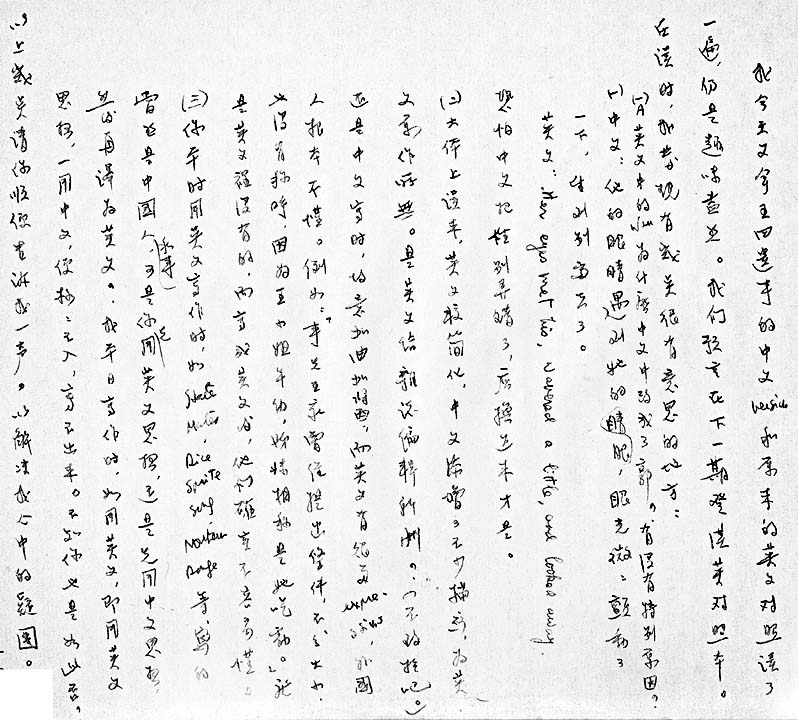
宋淇致張愛玲 1972.12.17

張愛玲致宋淇 1973.9.20
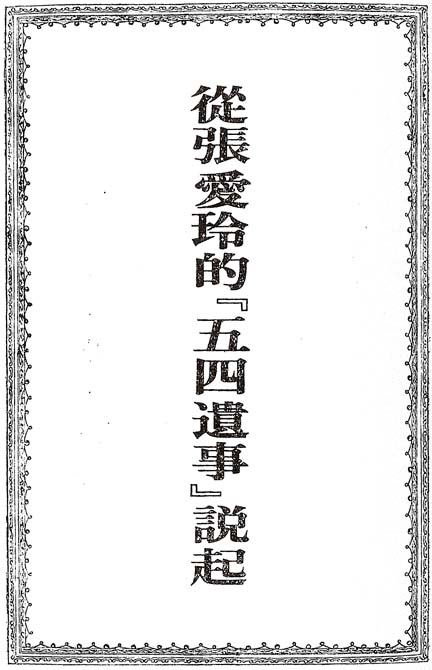
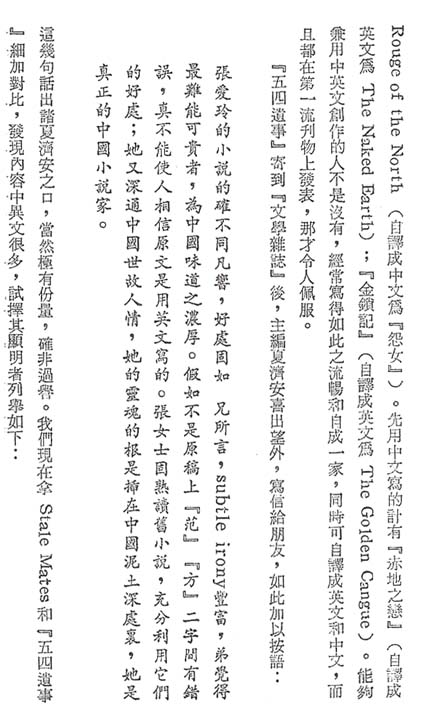
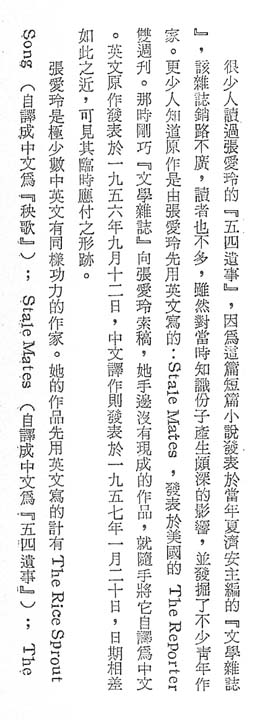
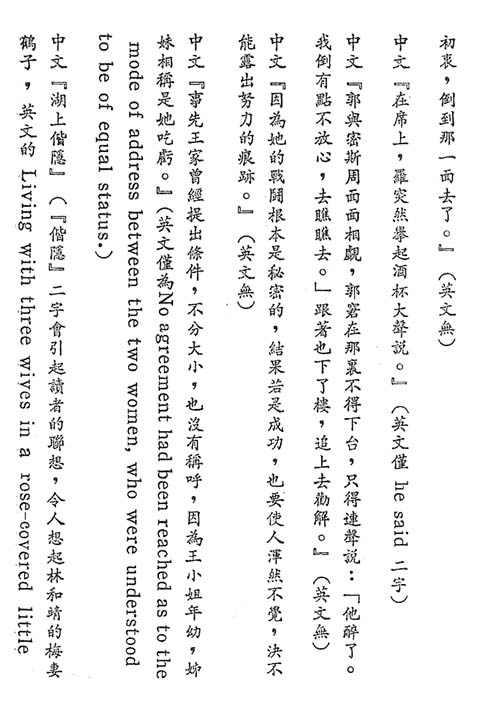
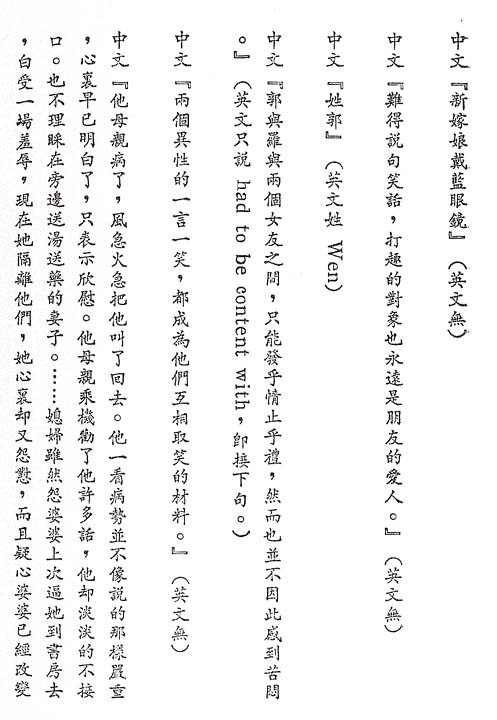

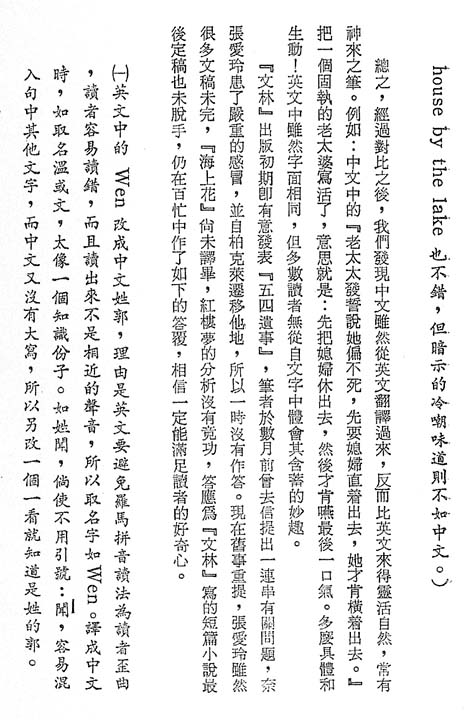
北京青年报 张爱玲《五四遗事》中的“五四”话题 2014.08.24
《五四遗事》是张爱玲上世纪五十年代中期在美国创作的,这个短小的故事很大程度上可以看作一则文化寓言,一方面是关于新文化传统的,另一方面则涉及张本人的个人史。
《五四遗事》应该很早就存于张爱玲脑中
《五四遗事》在张爱玲的作品中不是太引人注目,被人提及的不多,她自己谈论的也少。这个短篇的英文本发表在1956年9月20日纽约THE REPORTER双周刊,3又1/3页码,题名Stale Mates,后来收入《续集》时,在《自序》中附注“《老搭子》”。中文本刊在1957年1月20日夏济安主编的台北《文学杂志》第一卷第五期,8000 字,题名则是《五四遗事》。
自作自译是当时张爱玲的常态,1952年离开大陆到香港,在港三年,她是受美国新闻署资助进行写作的,《秧歌》和《赤地之恋》都是先有英文本再有中文本。1955年底赴美后,她首要的目标是在英美文学界能够生存,Pink Tears(《粉泪》)选择以往创作中最富戏剧张力的《金锁记》为基础进行扩张,大概是有她的考虑,不过失败了,十年后则自译为《怨女》。相对而言,Stale Mates篇幅短小,想必她并未期待能靠这个引起注意,更像是插空之作。
张爱玲后来将中英文本都收入《续集》,其自序中解释:“故事是同一个,表现的手法略有出入,因为要迁就读者的口味,绝不能说是翻译。”关于是否“说是翻译”,因为两个文本她都是作者,自有其自由,因而可以尊重她的说法。不过故事的主体并无大的出入。
《五四遗事》的故事应该很早以前就存于张爱玲脑中,《谈吃与画饼充饥》提到:“离开大陆前,因为想写的一篇小说里有西湖,我还是小时候去过,需要再去看看,就加入了中国旅行社办的观光团,由旅行社代办路条,免得自己去申请。”这十有八成就是后来写成的《五四遗事》。张爱玲小说题材大都有本事,有些来自家族或身边人,比如《倾城之恋》男女主角是香港沦陷时期她见过的,(《回顾倾城之恋》)《红玫瑰与白玫瑰》三个主人公她与其中两人相熟,(水晶《蝉—夜访张爱玲》)这都是她自己说的。而她弟弟也曾详解《金锁记》与《花凋》都是本于家族里的故事,因为太过“真实”还引起原型的愤怒(张子静、季季《我的姊姊张爱玲》第9章,文汇出版社2003年9月版)。
最近宋以朗披露并得到证实的,是张爱玲反复说“实在太坏”的《殷宝滟送花楼会》,本事居然是她同学告诉她的与傅雷的不伦恋(《傅雷评张爱玲小说前后》,《南方都市报》2013年2月5日)。其实这篇小说实在说不上写得坏,从写作发表时间来看,很让人怀疑是对半年前傅雷《论张爱玲的小说》的“报复”。(尽管宋淇《私语张爱玲》说,当年张不知道迅雨就是傅雷,但窃以为未可尽信。)有了《自己的文章》不过瘾,这送上门的故事就没有放过的理由了。另一类题材应该来自于“小报”,1945年8月《杂志》第15卷第5期上有个《纳凉会记》的访谈录,张爱玲谈到“一直从小就是小报的忠实读者,它有非常浓厚的生活情趣,可以代表我们这里的都市文明”,相对而言,“大报”“与实生活离得很远了”。这个倾向她保持了一辈子,水晶《蝉—夜访张爱玲》有个生动的细节:“她引用业已逝世的丈夫Rehyer的话说,Ferd常说我专看‘垃圾’trash!说完又笑了起来,像是非常的应该。”事实上,这些“垃圾”提供给她广阔的创作背景,其中一些也成为素材。
《五四遗事》这个故事现在还不知道是怎样一个来源,也许等她与宋淇、邝文美的通信全部公布后会有线索。
张爱玲觉得鲁迅很能暴露国人性格中的阴暗面和劣根性
对于“五四”,对于“新文艺”,张爱玲一直以来的语气间,并没有多大的认同感。初出道时的《自己的文章》,就颇为盛气地对“时代的纪念碑”式的创作祈望嗤之以鼻,声称自己“只是写些男女间的小事情”。“新文艺腔”在她那儿屡屡被提及,一直是个绝对可笑的负面词汇,“根本中国新文艺我喜欢的少得几乎没有” (1974年6月30日致夏志清)。而晚年《谈看书》,中间一段叙及二十年代以来的“社会小说”,如数家珍,可以想见其阅读之多,实际也可想见对其影响之大。张爱玲所叙述的这一传统,或者说她所汲取的营养,正是新文学兴起后与之并行的旧小说一路的主流。这就不难理解她为什么最初会投稿于《紫罗兰》,又为什么对傅雷给予她的期待生出那么大的反抗。
不过,对于胡适、周氏兄弟这些新文化运动的核心人物,张爱玲虽不感到亲近,倒也一直没有什么苛评。1952年到香港后,她的目标就是去美国,然后在那儿生活下去。1954年,她寄《秧歌》给在美的胡适,猜想私下的原因倒不在于期待得到如何的评价,而是以胡的人脉,结交后说不定可备不时之需。大约出乎她意料的是胡适极为认真地阅读,翌年赴美后和胡适几度交往,胡的宽厚给张很大的安慰和感动,以至于“如对神明”。胡适去世后,在回忆文章《忆胡适之》中,张爱玲专门谈到“五四”:
我屡次发现外国人不了解现代中国的时候,往往是因为不知道五四运动的影响。因为五四运动是对内的,对外只限于输入。我觉得不但我们这一代与上一代,就连大陆的下一代,尽管反胡适的时候许多青年已经不知道在反些什么,我想只要有心理学家荣(Jung)所谓民族回忆这样东西,像五四这样的经验是忘不了的,无论湮没多久也还是在思想背景里。荣与佛洛依德齐名,不免联想到佛洛依德研究出来的,摩西是被以色列人杀死的。事后他们自己讳言,年代久了又倒过来仍旧信奉他。这样的议论在张爱玲那儿是极为罕见的,将胡适喻为先知摩西,其背景是当时大陆的胡适大批判,因而对“五四”有这样的议论。1955年11月张到美国,至翌年2月在纽约停留,同胡适有过几次见面。随后约半年就有了《五四遗事》的英文版,不到一年又有了汉文版。严格地说,在这部小说中,张爱玲对“五四”所带来的自由恋爱,也就是Love Came to China并不否定,只是带着嘲讽的语气描写当年的做派。小说重心在于Love这个东西进入中国环境后的变异,被拖回了传统。诚所谓播下龙种,收获跳蚤。这有点类似她对新文艺的看法,七十年代初接受水晶访问(《蝉—夜访张爱玲》),在被问及鲁迅时她有这样的议论:
谈到鲁迅,她觉得他很能暴露中国人性格中的阴暗面和劣根性。这一种传统等到鲁迅一死,突告中断,很是可惜。因为后来的中国作家,在提高民族自信心的旗帜下,走的都是“文过饰非”的路子,只说好的,不说坏的,实在可惜。
《金锁记》颇有《狂人日记》中某些故事的风味
由于张爱玲一贯的心高气傲的自我表述,她与“五四”相关联的一面通常不被重视。这一段也是偶然被问及才带出来的,如果怀疑采访者记录的忠实程度,或者张是否只是应付性地随俗表达。那么她在英文创作屡屡碰壁后的反应,似乎能说明些问题。离开大陆以后,张爱玲明显是计划以英文写作立足,并以韩素英(即韩素音)为对照,认为自己远比韩高明,不会写韩那一路的东西。但与韩的成功相反,张几乎连出版社接受她的作品都困难,最后终于愤激地说:“我一向有个感觉,对东方特别喜欢的人,他们所喜欢的往往正是我想拆穿的。”(1974年11月21日致夏志清)自然,西方想看到的东方,或者他方,是为了满足自己的想象或补足自己的缺失。
所谓“拆穿”,毋宁说是鲁迅的气质。事实上,刚出道的张爱玲,尤其她的《金锁记》,在评论界是立即与鲁迅联系到了一起。1944年5月,《万象》第3卷第11期刊载迅雨《论张爱玲的小说》,其中提到“颇有《狂人日记》中某些故事的风味”。同时的1944年5、6月《杂志》第13卷第2、3期,胡兰成《评张爱玲》则干脆说,“鲁迅之后有她。她是个伟大的寻求者”。这是最早的两篇重要评论。傅雷所谓“《狂人日记》”,大概是一时手滑,本要说的是《呐喊》《彷徨》之类,因为《狂人日记》中很难说“某些故事”。虽然傅雷因他的文章与张爱玲起风波,但胡兰成发表文章时与张已是出双入对。看来她是并不反对这样的联系的。确实,就所塑造的人物的力量而言,曹七巧并不弱于祥林嫂,而由《金锁记》联想到《狂人日记》也并非没有道理。《狂人日记》和《金锁记》的开头:今天晚上,很好的月光。
我不见他,已是三十多年;今天见了,精神分外爽快。才知道以前的三十多年,全是发昏;然而须十分小心。不然,那赵家的狗,何以看我两眼呢?
三十年前的上海,一个有月亮的晚上……我们也许没赶上看见三十年前的月亮。年轻的人想着三十年前的月亮该是铜钱大的一个红黄的湿晕,像朵云轩信笺上落了一滴泪珠,陈旧而迷糊。老年人回忆中的三十年前的月亮是欢愉的,比眼前的月亮大、圆、白……
都是月亮,都是隔着三十年。二人气质殊异,而材质差似。因而不可因张爱玲反复强调她与旧小说传统的渊源,不断讽刺新文艺的腔调,就忽视她与“五四”的关联。类如《五四遗事》,恰恰是最“五四”的。
胡兰成的叙述和解读在两人故事中占据统治地位
就鲁迅所认为的真正的女性解放,即出走的娜拉,并且拥有自主的经济权,张爱玲几乎可称得上理想的模型。1938年初,18岁时她逃出父亲的家,依母亲和姑姑生活。其后最晚到1943年,在文坛陡然大红,经济完全独立,可以自由支配自己的物质生活和精神生活。“用别人的钱,即使是父母的遗产,也不如用自己赚来的钱自由自在,良心上非常痛快。”(《苏青、张爱玲对谈录》,《杂志》1945年3月第13卷第6期)鲁迅告诫姑娘们“万不可做将来的梦”,张爱玲天生就是个现世主义者。“呵,出名要趁早呀!来得太晚的话,快乐也不那么痛快。”(《传奇再版的话》)出名了,有钱了,感情的选择方面,也就有了自主的支配权,即使亲人也很难插手。同年张爱玲结识胡兰成,开始自由恋爱,一切似乎都很圆满。
从这个意义上说,张爱玲可以算是真正的“五四”产儿。不过最后收获的却还是悲剧,而且对于张爱玲来说,更为悲剧的是,有关她与胡兰成之间的问题,最终还是胡的叙述和解读占据了统治地位。这有两个原因,一是文体上的,张后来的《小团圆》等是小说,而胡的《今生今世》是自传,而且时间上要早得多。另一方面更重要的是,二人最后的分手对张爱玲是致命的打击,按她的说法,是“萎谢”了,不可能再有爱,因而长时间不愿触碰。而对胡兰成而言,这不过是他生活中—不是“生命”中—的一段际遇,而且是与“民国女子”,其得意是远超于惋惜的,真可以言之再三。
两人之间不能长久,其实并不在于世道的变迁,而在于能够相容本就是一场误会,在张爱玲那儿更是错觉。胡兰成是旧式才子,所谓“才子”,在中国有着很长的传统,并且发展出一种文化。简单说,就是在男女关系上,以“才”换取一定程度的道德赦免,因此 “薄幸”也可以获得审美。本来,这与以“力”、以“钱”获得性优势并无太大区别。但对受者而言,“才”是内在的,是所谓智力魅惑,因而是吸引而非强迫。而对施者而言,正因为本不是强迫,那就无须自责,更谈不上受谴责。张爱玲小说以平庸为传奇,自己要的是真正的传奇
胡兰成的自述,也可以轻易看到这种关系。面对目无余子的张爱玲,他几乎是轻而易举地进入,除了技巧的熟练,更在于心态的良好,毫无追求者的患得患失,因为本就谈不上是个追求者。接着将二人的相处营造得毫无烟火气,与世俗生活完全隔离。恰恰张爱玲自视极高,小说以平庸为传奇,自己要的却是真正的传奇。加以从小处处反抗,本就对世俗观念不以为然,只要“两情相悦”,甚至胡本有妻室她也无所谓。结果这一极为前卫的现代观念,与胡古老的才子佳人之思,奇妙地“错位耦合”在了一起。
这种镜花水月自然不能接触空气,张在胡大难将临之时与其缔结婚约,是准备义无反顾的。而且此时胡与原配已经离婚,并无事实的障碍。不过在胡那儿,这还是才子佳人故事的一个情节而已。也就半年,在武汉与“小周”(训德)又结了一次,再不到一年,在温州与“范先生”(秀美)事实夫妻。同时对于张爱玲,他的意愿是也要保存在那儿,这种局面对他根本就不成问题。在张要他抉择时,他理直气壮地拒绝,因为他的道德决定了,他对谁都不能“负心”,那不公平。
终于,张爱玲与胡兰成决裂,像极了胡适译本中娜拉所说的话:“须要变到那步田地,要使我们同居的生活,可以算得真正夫妻—再会了。”之后胡东躲西藏数年,1950年离开大陆,在香港半年后往日本。此时“小周”结婚了,“秀美”无法再见了。不过在东京他又有了“一枝”,接着是佘爱珍。期间找一切机会联系张爱玲,函件中语气不无撩拨,直到张最后警告才作罢。
《五四遗事》汉文本有一个奇怪的副标题
张爱玲1955年底到美国,翌年3月结识赖雅 Rehyer,8月14日就结了婚,与过去的生活一撅两段。而9月20日Stale Mates就刊出了,像是结婚的纪念品,随后就是汉文本的《五四遗事》。Stale Mates的副标题A Short Story Set in the Time When Love Came to China,无论如何是个必要的存在,用以解释小说的意旨。到汉文本就无需了,不过汉文本又另起了一个奇怪的副标题:《罗文涛三美团圆》。
首先“罗文涛”就莫名其妙,因为在本文中所有人物都只出现姓氏。男主角罗(Lo)和配角郭(Wen),女主角范(Fan)和配角周(Chou)。其中英文本中的Wen,不知原想的是闻还是温,改为郭,大约只是为音节上更为协调。其他两位罗的前夫人,一位是王(Wong),而原配张(Chang),在汉文本中真是过于惨淡,是由于“娘家人却气得揎拳掳臂,说:‘他们罗家太欺负人。当我们张家人都死光了?读者才知道姓张。总之,都是姓氏,没有一位出现过名字。这样处理的原因,应该是由于本篇先有英文本,对英文读者来说,“我们‘三字经’式的名字他们连看几个立刻头晕眼花起来,不比我们自己看着,文字本身在视觉上有色彩”。(《忆胡适之》)这种做法到汉文本也就延续了过来。既然如此,何必在副标题中冒出个“罗文涛”?实在是难以索解,大约只有她自己清楚了。小说中对罗的描写,“身材较瘦长的一个姓罗,长长的脸,一件浅色熟罗长衫在他身上挂下来,自有一种飘然的姿势。”这似乎有点像谁?
当然,并不是说这篇小说是在影射什么。故事应该另有来源,“三美团圆”的原型,是发生在别一个时间别一个空间的别一些人,甚至“关起门来就是一桌麻将” 也可能是她听来的原话。只是当年胡兰成所希望的才子佳人的结局也正是“三美团圆”,张爱玲写作时潜意识中很难不泛起这些吧。其时她很大程度是为了美国绿卡而再度结婚,正采取措施彻底终结胡兰成的纠缠,“团圆”终究成为了她巨大词库中最具有反讽性的一个词汇。
十一年后赖雅去世,张爱玲完全与世隔绝,晚年为了躲避fleas(跳蚤),拼命搬家。她自己所承认的处女作《天才梦》,结尾的名句:“生命是一袭华美的袍,爬满了蚤子。”四十年后,她才意识到是“虱子”的误写。(《对现代中文的一点小意见》)不过无论如何,这种原是精神的“小咬啮”最终施加于实实在在的肉体,确实让人同情。对于世人,张爱玲也像躲避“蚤子”一样逃难。因而,在美国生活了四十年的张爱玲,除了《同学少年都不贱》,没有一篇小说的题材晚于她赴美之前,她所有的生活记忆都封闭在了那个时候。
别人的故事总会写完,终于,她开始写自己的故事,题目是《小团圆》—是的,还是“团圆”。
(本文作者王风 北京大学中文系教授)